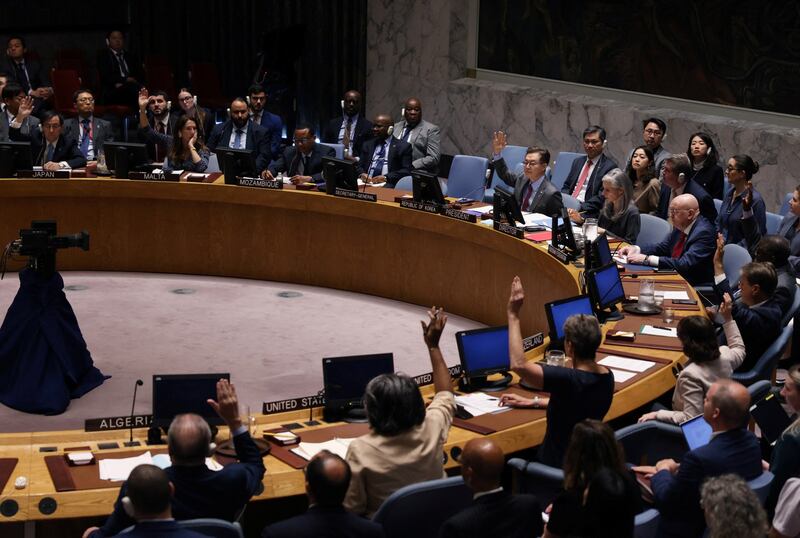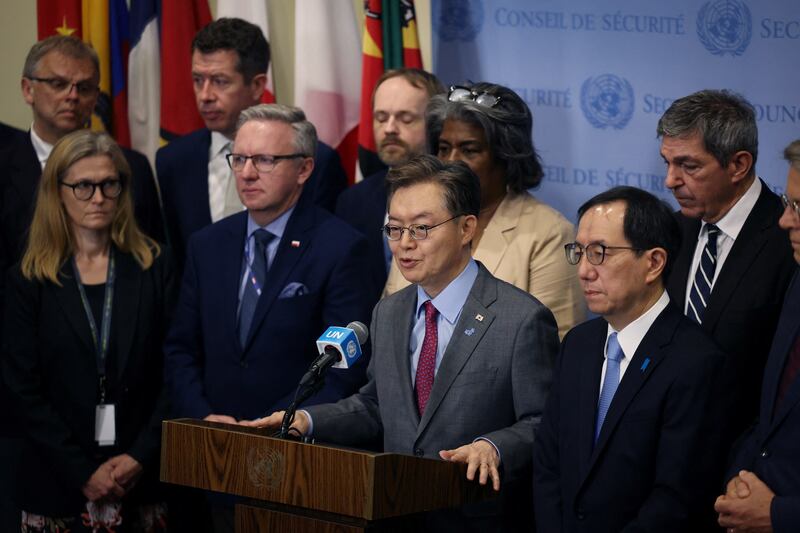North Korea’s human rights took center stage at a U.N. Security Council (UNSC) meeting as diplomats, experts and activists strongly condemned a deteriorating rights situation, saying North Korea is increasing the suffering of its people while pursuing its nuclear program.
The meeting was held annually from 2014 to 2017 but then went on a hiatus before resuming in August last year. The meeting on Wednesday was the first the council has held on North Korea’s rights in 10 months.
“If human rights violations stop, nuclear weapons development will also stop,” said South Korea’s ambassador to the U.N., Hwang Joon-kook, who is this month’s rotating UNSC president.
“This is why we need to look at the DPRK human rights situation from the perspective of international peace and security,” he added, referring to the North by its official name, the Democratic People’s Republic of Korea.
U.N. High Commissioner for Human Rights Volker Türk told the meeting that repression of freedom of movement and expression had intensified in North Korea in recent years, and that socio-economic living conditions had become unbearably harsh due to food shortages.
“Accountability for these longstanding, serious and widespread violations needs to be a priority. Ten years ago, the U.N. Commission of Inquiry on human rights in the DPRK called on the Council to refer the situation to the International Criminal Court, which I endorse,” said Türk.
U.N. Special Rapporteur on human rights in North Korea Elizabeth Salmon also stressed that Pyongyang’s continued prioritization of its military, nuclear and missile programs has put a heavy burden on the people, particularly women and children.
“Resources available for realizing human rights are reduced, exploitation of labor to finance militarization becomes rampant, and, as a result, the protection of fundamental freedoms and human rights is often overlooked,” she said.

U.S. Ambassador to the U.N. Linda Thomas-Greenfield reiterated that she has made it a priority to meet North Korean defectors and push the North's human rights abuses to the “top” of the UNSC agenda.
“Protecting human rights is not a distraction from safeguarding peace and security. The two are inextricably linked,” she said.
Japanese Ambassador to the U.N. Kazuyuki Yamazaki urged North Korea to take “tangible steps” to address human rights violations.
“We strongly urge it to suspend its nuclear and ballistic missile programs and return to dialogue in full compliance with Security Council resolutions,” said Yamazaki.
A young North Korean defector representing civil society also spoke, appealing to the international community to stand with the North Korean people, not the regime.
“The country that supposedly had nothing to envy in the world was nowhere to be seen,” said Kim, referring to a North Korean slogan. “In its place were political prison camps, death from starvation, public executions and people risking their lives to escape.”
“We need to give the same level of importance to North Korea’s people’s rights as we do to nuclear weapons and missiles.”
Russian, Chinese displeasure
Russian and Chinese representatives, who opposed a procedural vote on the adoption of the human rights agenda, voiced their displeasure at the meeting.
“While the whole world looks toward the council with hope, anticipating that it will resolve complicated global issues, it is squandering resources on a discussion of groundless and blatantly politicized matters,” said Vasily Nebenzya, Russia’s ambassador to the U.N.
Geng Shuang, China’s deputy U.N. representative, reiterated Beijing’s position that the UNSC is not the proper place to address human rights issues.
“It should not intervene in country-specific human rights issues,” he said. “We’ve always opposed the politicization of human rights issues or using human rights as a pretext to exert pressure on other countries.”
Joint statement
Before the UNSC meeting, 57 U.N. member states and the delegation of the European Union issued a statement on the North’s rights, calling for all U.N. members to work together to bring “concrete” change to improve the welfare of North Koreans and contribute to a more peaceful and secure world.

“The DPRK continues to commit systematic, widespread and gross human rights violations and abuses,” they said in a statement read out by South Korea’s Ambassador to the U.N. Hwang.
“These include restrictions on freedom of expression, freedom of movement, collective punishment, arbitrary detention, torture and other cruel, inhumane and degrading punishments, including public executions without trial and issues related to abductees, detainees and unrepatriated prisoners of war.”
Edited by RFA Staff.
